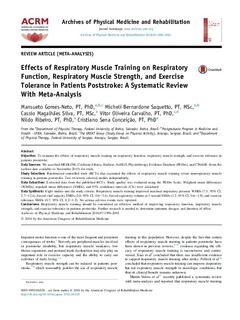| dc.contributor.author | Gomes-Neto, Mansueto | |
| dc.contributor.author | Saquetto, Micheli Bernardone | |
| dc.contributor.author | Silva, Cassio Magalhães | |
| dc.contributor.author | Carvalho, Vitor Oliveira | |
| dc.contributor.author | Ribeiro, Nildo | |
| dc.contributor.author | Conceição, Cristiano Sena | |
| dc.date.accessioned | 2019-02-28T13:37:01Z | |
| dc.date.available | 2019-02-28T13:37:01Z | |
| dc.date.issued | 2016 | |
| dc.identifier.citation | Mansueto Gomes-Neto, Micheli Bernardone Saquetto, Cassio Magalhães Silva, Vitor Oliveira Carvalho, Nildo Ribeiro, Cristiano Sena Conceição (2016).Effects of Respiratory Muscle Training on Respiratory Function, Respiratory Muscle Strength, and Exercise Tolerance in Patients Poststroke: A Systematic Review With Meta-Analysis. Archives of Physical Medicine and Rehabilitation, Volume 97, Issue 11, 2016, pp. 1994-2001. | nb_NO |
| dc.identifier.uri | http://hdl.handle.net/11250/2588087 | |
| dc.description.abstract | Objective
To examine the effects of respiratory muscle training on respiratory function, respiratory muscle strength, and exercise tolerance in patients poststroke.
Data Sources
We searched MEDLINE, Cochrane Library, Embase, SciELO, Physiotherapy Evidence Database (PEDro), and CINAHL (from the earliest date available to November 2015) for trials.
Study Selection
Randomized controlled trials (RCTs) that examined the effects of respiratory muscle training versus nonrespiratory muscle training in patients poststroke. Two reviewers selected studies independently.
Data Extraction
Extracted data from the published RCTs. Study quality was evaluated using the PEDro Scale. Weighted mean differences (WMDs), standard mean differences (SMDs), and 95% confidence intervals (CIs) were calculated.
Data Synthesis
Eight studies met the study criteria. Respiratory muscle training improved maximal inspiratory pressure WMDs (7.5; 95% CI, 2.7–12.4), forced vital capacity SMDs (2.0; 95% CI, 0.6–3.4), forced expiratory volume at 1 second SMDs (1.2; 95% CI, 0.6–1.9), and exercise tolerance SMDs (0.7; 95% CI, 0.2–1.2). No serious adverse events were reported.
Conclusions
Respiratory muscle training should be considered an effective method of improving respiratory function, inspiratory muscle strength, and exercise tolerance in patients poststroke. Further research is needed to determine optimum dosages and duration of effect. | nb_NO |
| dc.publisher | Archives of Physical Medicine and Rehabilitation | nb_NO |
| dc.subject | exercise | nb_NO |
| dc.subject | rehabilitation | nb_NO |
| dc.subject | stroke | nb_NO |
| dc.subject | nevrologiske lidelser | nb_NO |
| dc.title | Effects of Respiratory Muscle Training on Respiratory Function, Respiratory Muscle Strength, and Exercise Tolerance in Patients Poststroke: A Systematic Review With Meta-Analysis | nb_NO |
| dc.type | Journal article | nb_NO |
| dc.source.pagenumber | 1994-2001 | nb_NO |
| dc.source.volume | 97 | nb_NO |
| dc.source.journal | Archives of Physical Medicine and Rehabilitation | nb_NO |
| dc.source.issue | 11 | nb_NO |
| dc.identifier.doi | https://doi.org/10.1016/j.apmr.2016.04.018 | |
| dc.description.localcode | måsjekkes | |
